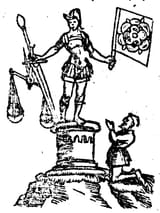Search Results
6/27/2025, 4:39:58 PM
>>17795715
>A Germanic god Irmin, inferred from the name Irminsûl and the tribal name Irminones, is in some older scholarship presumed to have been the national god or demi-god of the Saxons. It has been suggested that Irmin was more probably an aspect or epithet of some other deity – most likely Wodan (Odin). Irmin might also have been an epithet of the god Ziu (Tyr) in early Germanic times, only later transferred to Odin, as certain scholars subscribe to the idea that Odin replaced Tyr as the chief Germanic deity at the onset of the Migration Period. This was the favored view of early 20th century Nordicist writers, but it is not generally considered likely in modern times
>Irmin and Saxnot are two Old Saxon gods, whom certain researchers equate with the god Ziu (Old Saxon *Tiu; the name, however, has never been preserved!). But other meanings are also possible
>Irmin is only named by the monk Widukind of Corvey, in connection with the destruction of Irminsul. Widukind claims that Irmin can be equated with the Greek god Hermes and the Roman god Mars. Because Mars is the god of war, it is accepted that Irmin could be a form of *Tiu*. The Nordic god name Jörmunr corresponds to this, which is one of the many names of the god Odin. Therefore, a simile with the Old Saxon god Wodan is also possible. The name means "great, universal." Because Widukind's position is confused, many researchers consider Irmin to be a spurious god
>An irminsul or ermensul (/ˈer.men.sul/) is an object or symbol depicting something sacred by the Saxons, a group of ancient Germanic tribes. It is not known clearly what It is usually described as a 'divine tree', 'tree', '(tree) altar', or 'sacred pillar'. According to the former, Irminsul is presumed to refer to a world tree comparable to Yggdrasil in Norse mythology, and Benedictine Rudolf von Fulda, a monk, propounded this theory
>A Germanic god Irmin, inferred from the name Irminsûl and the tribal name Irminones, is in some older scholarship presumed to have been the national god or demi-god of the Saxons. It has been suggested that Irmin was more probably an aspect or epithet of some other deity – most likely Wodan (Odin). Irmin might also have been an epithet of the god Ziu (Tyr) in early Germanic times, only later transferred to Odin, as certain scholars subscribe to the idea that Odin replaced Tyr as the chief Germanic deity at the onset of the Migration Period. This was the favored view of early 20th century Nordicist writers, but it is not generally considered likely in modern times
>Irmin and Saxnot are two Old Saxon gods, whom certain researchers equate with the god Ziu (Old Saxon *Tiu; the name, however, has never been preserved!). But other meanings are also possible
>Irmin is only named by the monk Widukind of Corvey, in connection with the destruction of Irminsul. Widukind claims that Irmin can be equated with the Greek god Hermes and the Roman god Mars. Because Mars is the god of war, it is accepted that Irmin could be a form of *Tiu*. The Nordic god name Jörmunr corresponds to this, which is one of the many names of the god Odin. Therefore, a simile with the Old Saxon god Wodan is also possible. The name means "great, universal." Because Widukind's position is confused, many researchers consider Irmin to be a spurious god
>An irminsul or ermensul (/ˈer.men.sul/) is an object or symbol depicting something sacred by the Saxons, a group of ancient Germanic tribes. It is not known clearly what It is usually described as a 'divine tree', 'tree', '(tree) altar', or 'sacred pillar'. According to the former, Irminsul is presumed to refer to a world tree comparable to Yggdrasil in Norse mythology, and Benedictine Rudolf von Fulda, a monk, propounded this theory
Page 1
